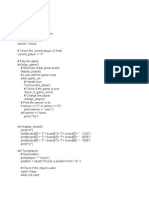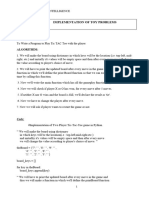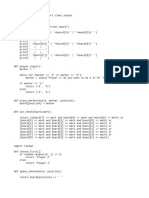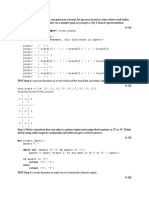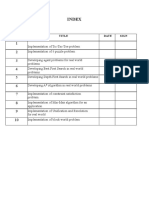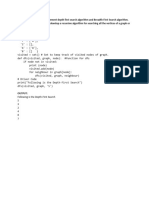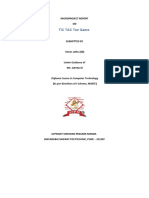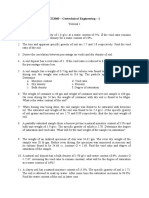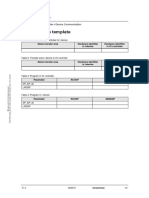0 ratings0% found this document useful (0 votes)
62 viewsTIC TAC TOE Code
TIC TAC TOE Code
Uploaded by
Tejavath Kranthi Kiran99This document contains the code for a tic-tac-toe game. It defines global variables to track the game board, current player, and winner. Functions are used to handle turns, check for a winner or tie, and flip the current player. The main play_game function runs the game loop, calling these other functions until a winner is determined or a tie occurs.
Copyright:
© All Rights Reserved
Available Formats
Download as PDF, TXT or read online from Scribd
TIC TAC TOE Code
TIC TAC TOE Code
Uploaded by
Tejavath Kranthi Kiran990 ratings0% found this document useful (0 votes)
62 views5 pagesThis document contains the code for a tic-tac-toe game. It defines global variables to track the game board, current player, and winner. Functions are used to handle turns, check for a winner or tie, and flip the current player. The main play_game function runs the game loop, calling these other functions until a winner is determined or a tie occurs.
Copyright
© © All Rights Reserved
Available Formats
PDF, TXT or read online from Scribd
Share this document
Did you find this document useful?
Is this content inappropriate?
This document contains the code for a tic-tac-toe game. It defines global variables to track the game board, current player, and winner. Functions are used to handle turns, check for a winner or tie, and flip the current player. The main play_game function runs the game loop, calling these other functions until a winner is determined or a tie occurs.
Copyright:
© All Rights Reserved
Available Formats
Download as PDF, TXT or read online from Scribd
Download as pdf or txt
0 ratings0% found this document useful (0 votes)
62 views5 pagesTIC TAC TOE Code
TIC TAC TOE Code
Uploaded by
Tejavath Kranthi Kiran99This document contains the code for a tic-tac-toe game. It defines global variables to track the game board, current player, and winner. Functions are used to handle turns, check for a winner or tie, and flip the current player. The main play_game function runs the game loop, calling these other functions until a winner is determined or a tie occurs.
Copyright:
© All Rights Reserved
Available Formats
Download as PDF, TXT or read online from Scribd
Download as pdf or txt
You are on page 1of 5
# --------- Global Variables -----------
# Will hold our game board data
board = ["-", "-", "-",
"-", "-", "-",
"-", "-", "-"]
# Lets us know if the game is over yet
game_still_going = True
# Tells us who the winner is
winner = None
# Tells us who the current player is (X goes first)
current_player = "X"
# ------------- Functions ---------------
# Play a game of tic tac toe
def play_game():
# Show the initial game board
display_board()
# Loop until the game stops (winner or tie)
while game_still_going:
# Handle a turn
handle_turn(current_player)
# Check if the game is over
check_if_game_over()
# Flip to the other player
flip_player()
# Since the game is over, print the winner or tie
if winner == "X" or winner == "O":
print(winner + " won.")
elif winner == None:
print("Tie.")
# Display the game board to the screen
def display_board():
print("\n")
print(board[0] + " | " + board[1] + " | " + board[2] + " 1 | 2 | 3")
print(board[3] + " | " + board[4] + " | " + board[5] + " 4 | 5 | 6")
print(board[6] + " | " + board[7] + " | " + board[8] + " 7 | 8 | 9")
print("\n")
# Handle a turn for an arbitrary player
def handle_turn(player):
# Get position from player
print(player + "'s turn.")
position = input("Choose a position from 1-9: ")
# Whatever the user inputs, make sure it is a valid input, and the spot is open
valid = False
while not valid:
# Make sure the input is valid
while position not in ["1", "2", "3", "4", "5", "6", "7", "8", "9"]:
position = input("Choose a position from 1-9: ")
# Get correct index in our board list
position = int(position) - 1
# Then also make sure the spot is available on the board
if board[position] == "-":
valid = True
else:
print("You can't go there. Go again.")
# Put the game piece on the board
board[position] = player
# Show the game board
display_board()
# Check if the game is over
def check_if_game_over():
check_for_winner()
check_for_tie()
# Check to see if somebody has won
def check_for_winner():
# Set global variables
global winner
# Check if there was a winner anywhere
row_winner = check_rows()
column_winner = check_columns()
diagonal_winner = check_diagonals()
# Get the winner
if row_winner:
winner = row_winner
elif column_winner:
winner = column_winner
elif diagonal_winner:
winner = diagonal_winner
else:
winner = None
# Check the rows for a win
def check_rows():
# Set global variables
global game_still_going
# Check if any of the rows have all the same value (and is not empty)
row_1 = board[0] == board[1] == board[2] != "-"
row_2 = board[3] == board[4] == board[5] != "-"
row_3 = board[6] == board[7] == board[8] != "-"
# If any row does have a match, flag that there is a win
if row_1 or row_2 or row_3:
game_still_going = False
# Return the winner
if row_1:
return board[0]
elif row_2:
return board[3]
elif row_3:
return board[6]
# Or return None if there was no winner
else:
return None
# Check the columns for a win
def check_columns():
# Set global variables
global game_still_going
# Check if any of the columns have all the same value (and is not empty)
column_1 = board[0] == board[3] == board[6] != "-"
column_2 = board[1] == board[4] == board[7] != "-"
column_3 = board[2] == board[5] == board[8] != "-"
# If any row does have a match, flag that there is a win
if column_1 or column_2 or column_3:
game_still_going = False
# Return the winner
if column_1:
return board[0]
elif column_2:
return board[1]
elif column_3:
return board[2]
# Or return None if there was no winner
else:
return None
# Check the diagonals for a win
def check_diagonals():
# Set global variables
global game_still_going
# Check if any of the columns have all the same value (and is not empty)
diagonal_1 = board[0] == board[4] == board[8] != "-"
diagonal_2 = board[2] == board[4] == board[6] != "-"
# If any row does have a match, flag that there is a win
if diagonal_1 or diagonal_2:
game_still_going = False
# Return the winner
if diagonal_1:
return board[0]
elif diagonal_2:
return board[2]
# Or return None if there was no winner
else:
return None
# Check if there is a tie
def check_for_tie():
# Set global variables
global game_still_going
# If board is full
if "-" not in board:
game_still_going = False
return True
# Else there is no tie
else:
return False
# Flip the current player from X to O, or O to X
def flip_player():
# Global variables we need
global current_player
# If the current player was X, make it O
if current_player == "X":
current_player = "O"
# Or if the current player was O, make it X
elif current_player == "O":
current_player = "X"
# ------------ Start Execution -------------
# Play a game of tic tac toe
play_game()
You might also like
- MyTutor 18 - 56 - 38 GMT+0100 (British Summer Time)Document11 pagesMyTutor 18 - 56 - 38 GMT+0100 (British Summer Time)Emre Kaya0% (1)
- SINAMICS DC Converter ManualDocument706 pagesSINAMICS DC Converter Manualmostafa3133% (3)
- Primetime PX Methodology For Power AnalysisDocument21 pagesPrimetime PX Methodology For Power AnalysisAditya TomarNo ratings yet
- Tic Tac Toe - PyDocument4 pagesTic Tac Toe - PyFranklin NguyenNo ratings yet
- Tic Toe Game Using PythonDocument2 pagesTic Toe Game Using Pythonharshitakeshari033No ratings yet
- Code Pal ResultDocument3 pagesCode Pal ResultHafidz Al QiramNo ratings yet
- P CounterDocument10 pagesP Counterattastudy7No ratings yet
- Ai PRA1Document6 pagesAi PRA1Joshi LabheshNo ratings yet
- Game Theory Lab Experiment 10Document3 pagesGame Theory Lab Experiment 1021106053.rohit.negiNo ratings yet
- Game Theory Lab Experiment 10Document3 pagesGame Theory Lab Experiment 1021106053.rohit.negiNo ratings yet
- TictactoeDocument6 pagesTictactoeSuraj ChauhanNo ratings yet
- Ai Record FinalDocument63 pagesAi Record Finalsydhasan003No ratings yet
- GameDocument8 pagesGameMeg AeraNo ratings yet
- Experiment - 7Document7 pagesExperiment - 7kamala lakshmipathiNo ratings yet
- SawDocument4 pagesSawPuttipongtornNo ratings yet
- Notebook For The Milestone Project 1Document3 pagesNotebook For The Milestone Project 1xSoft.Hearten?100% (1)
- Python Project X-O GameDocument6 pagesPython Project X-O Game8rg48v4zgfNo ratings yet
- TC TAC TOE GAMEDocument4 pagesTC TAC TOE GAMEasiflife6No ratings yet
- CS Project-1Document4 pagesCS Project-1noobgaming6890No ratings yet
- 4 EdaffasDocument4 pages4 EdaffasYavuz ÇoruhNo ratings yet
- Tic Tac Toe PDFDocument5 pagesTic Tac Toe PDFShaik JunaidNo ratings yet
- Muku CodingDocument2 pagesMuku Codingchikachika111222No ratings yet
- From Ipython - Display Import Clear - Output Def Display - Board (Board)Document5 pagesFrom Ipython - Display Import Clear - Output Def Display - Board (Board)Mansi ShahNo ratings yet
- programmingDocument2 pagesprogrammingdivyanshi1028No ratings yet
- Random No.Document3 pagesRandom No.abhi rajNo ratings yet
- LAB06 AiDocument16 pagesLAB06 Aigocev58088No ratings yet
- Aiml Practical 1Document5 pagesAiml Practical 1MAN PatelNo ratings yet
- Experiment-5: AIM: Write A Program To Implement The Tic-Tac-Toe Game Problem. TheoryDocument5 pagesExperiment-5: AIM: Write A Program To Implement The Tic-Tac-Toe Game Problem. Theoryakshat sharmaNo ratings yet
- Inventwithpython ComDocument15 pagesInventwithpython ComSanyamNo ratings yet
- AI LAB Manual 03Document58 pagesAI LAB Manual 03Diksha NasaNo ratings yet
- AI program codes 2023Document9 pagesAI program codes 2023parth92.6000No ratings yet
- Tic Tac ToeDocument7 pagesTic Tac ToeJ YasaswiniNo ratings yet
- #Program in Python For Tic-Tac-Toe Using Min-Max Method: Maulik Varshney 219310274 Section C (Ai and ML)Document4 pages#Program in Python For Tic-Tac-Toe Using Min-Max Method: Maulik Varshney 219310274 Section C (Ai and ML)Maulik VarshneyNo ratings yet
- Prisoner's Dilemma GameDocument4 pagesPrisoner's Dilemma GameDamian MirzaNo ratings yet
- CODES For Long WeekendDocument3 pagesCODES For Long WeekendMahboob RiazNo ratings yet
- PythonDocument9 pagesPythonClarence NolascoNo ratings yet
- Python Pbl2Document13 pagesPython Pbl2Sahil SoniNo ratings yet
- Experiment-: Write A Program To Implement Tic-Tac-Toe Game Problem CodeDocument4 pagesExperiment-: Write A Program To Implement Tic-Tac-Toe Game Problem CodeyashNo ratings yet
- PythonDocument9 pagesPythonClarence NolascoNo ratings yet
- Msbte Micro ProjectDocument12 pagesMsbte Micro ProjectThe LooserNo ratings yet
- Tic Tac Toe - PyDocument2 pagesTic Tac Toe - PyRam DhuniNo ratings yet
- Gomoku CodeDocument4 pagesGomoku CodeNoor SinghNo ratings yet
- CS - Tic Tac Toe - ProjectDocument5 pagesCS - Tic Tac Toe - Projectrisalrazanliza123No ratings yet
- Practical No 4Document3 pagesPractical No 4Samiksha DesaiNo ratings yet
- Aim - To Build A Player Vs Computer Tic-Tac-Toe Game in Python. Theory - Source CodeDocument3 pagesAim - To Build A Player Vs Computer Tic-Tac-Toe Game in Python. Theory - Source Codechiranjeev sharmaNo ratings yet
- Tic Tac Toe ProgramDocument2 pagesTic Tac Toe Programharoon aliNo ratings yet
- Code Tic Tac ToeDocument4 pagesCode Tic Tac ToeShaik GhouseNo ratings yet
- Assignment 1Document4 pagesAssignment 1Raushan RajNo ratings yet
- Python Tic Tac ToeDocument6 pagesPython Tic Tac Toejabirsadiq2017No ratings yet
- Ai Ass 6Document4 pagesAi Ass 6khanaadil8650No ratings yet
- Implementation of BFS For Tic-Tac-Toe ProblemDocument2 pagesImplementation of BFS For Tic-Tac-Toe Problemrayalbeast1000No ratings yet
- Analyse Ce Code Et Réécrit Le Complémentement À Partir de Ci DessusDocument16 pagesAnalyse Ce Code Et Réécrit Le Complémentement À Partir de Ci Dessuscurytony7No ratings yet
- Homework 4 - TicTacToeDocument19 pagesHomework 4 - TicTacToeAkanksha GundNo ratings yet
- AILabmanualdocx 2024 10 07 16 11 01Document12 pagesAILabmanualdocx 2024 10 07 16 11 01Âñkït Bháñgålíã 66No ratings yet
- Print CodesDocument2 pagesPrint CodesziadNo ratings yet
- Lab Manual AI Lab VI SemDocument34 pagesLab Manual AI Lab VI SemAssoc.Prof, CSE , Vel Tech, ChennaiNo ratings yet
- DadiDocument5 pagesDadiGïø KavtaradzeNo ratings yet
- Tic Tac Toe Project ReportDocument21 pagesTic Tac Toe Project Reportjasmine29sainiNo ratings yet
- Lab Manual AI Lab VI SemDocument50 pagesLab Manual AI Lab VI SemNikhil KumarNo ratings yet
- Lab Assignment 02Document22 pagesLab Assignment 02Mohsin RazaNo ratings yet
- Lab Programs.Document21 pagesLab Programs.ramNo ratings yet
- GN Assignment 1 - Ce18b041Document3 pagesGN Assignment 1 - Ce18b041Tejavath Kranthi Kiran99No ratings yet
- CE 5010: Assignment - 1: Question 1 (4 Marks)Document1 pageCE 5010: Assignment - 1: Question 1 (4 Marks)Tejavath Kranthi Kiran99No ratings yet
- CE 5010 Assignment - 2 (Due On Aug 31) : Question 1 (3 Marks)Document1 pageCE 5010 Assignment - 2 (Due On Aug 31) : Question 1 (3 Marks)Tejavath Kranthi Kiran99No ratings yet
- CE2060 - Geotechnical Engineering - 1Document2 pagesCE2060 - Geotechnical Engineering - 1Tejavath Kranthi Kiran99No ratings yet
- Chapter 1Document16 pagesChapter 1Tejavath Kranthi Kiran99No ratings yet
- Mass Upload and Mass Update GuideDocument23 pagesMass Upload and Mass Update GuideGeb SopNo ratings yet
- Product Description Example Pid (Project Intiation Document)Document6 pagesProduct Description Example Pid (Project Intiation Document)Rotari Ioan100% (1)
- Sarmago, Zhienrod D. 11-Locke Seatwork2 (Ict Java)Document9 pagesSarmago, Zhienrod D. 11-Locke Seatwork2 (Ict Java)zhienrod sarmagoNo ratings yet
- Vista Black EditionDocument13 pagesVista Black Editionheri1177100% (1)
- 7.using Delegates in C#Document10 pages7.using Delegates in C#safia sadafNo ratings yet
- Buzaao Fire Safety PlatformDocument4 pagesBuzaao Fire Safety PlatformTanujHandaNo ratings yet
- Masters in CS - Data Science and Artificial Intelligence BrochureDocument23 pagesMasters in CS - Data Science and Artificial Intelligence Brochuretechysuman135No ratings yet
- Qlik Sense DesktopDocument26 pagesQlik Sense DesktopSorin BogdeNo ratings yet
- Industrial Load ModelingDocument15 pagesIndustrial Load ModelingSandeepNo ratings yet
- Utsav Bajpai: EducationDocument1 pageUtsav Bajpai: EducationUtsav BajpaiNo ratings yet
- Packz 4Document18 pagesPackz 4Novoriginal GraficaNo ratings yet
- Software Development With Visual Basic B.com CaDocument122 pagesSoftware Development With Visual Basic B.com Caaarvi2473No ratings yet
- Panelrouter UkDocument40 pagesPanelrouter UkОлег ДавыдовNo ratings yet
- Motorcycle Parking System: Central Park Mall JakartaDocument61 pagesMotorcycle Parking System: Central Park Mall JakartaIrma AmelNo ratings yet
- Configuration Template: Safety-Related IO Controller-I-Device CommunicationDocument2 pagesConfiguration Template: Safety-Related IO Controller-I-Device CommunicationAbel MogesNo ratings yet
- Prinect Package Designer Illustrator Plugin InstallationDocument16 pagesPrinect Package Designer Illustrator Plugin InstallationAndrés Febres-CorderoNo ratings yet
- Idce 101Document6 pagesIdce 101Tafadzwa ChiwesheNo ratings yet
- RPF TemplateDocument5 pagesRPF TemplatecolombiasouNo ratings yet
- TFS Planning Guide v1.3 PDFDocument109 pagesTFS Planning Guide v1.3 PDFmrsneculaNo ratings yet
- Catalogue ZWCAD 2017 For ReadingDocument10 pagesCatalogue ZWCAD 2017 For ReadingSakthi VelNo ratings yet
- Guide To Using CanvaDocument9 pagesGuide To Using CanvaSofie SharloteNo ratings yet
- Comandos Avanzados de Consola para Router HP 3comDocument4 pagesComandos Avanzados de Consola para Router HP 3comcgf_arNo ratings yet
- Rajalakshmi Engineering College ME 1006 Quality Control and Reliability Engineering Lesson Plan SL - No. Topic Unit 1Document3 pagesRajalakshmi Engineering College ME 1006 Quality Control and Reliability Engineering Lesson Plan SL - No. Topic Unit 1Manoj KbNo ratings yet
- X748 PDFDocument634 pagesX748 PDFjorgeNo ratings yet
- Intel® Core™ I3-540 Processor (4M Cache, 3.06 GHZ) : Compare Queue (0) Send FeedbackDocument3 pagesIntel® Core™ I3-540 Processor (4M Cache, 3.06 GHZ) : Compare Queue (0) Send FeedbackRavikiran DigavalliNo ratings yet
- LAB 1 - Motherboards (Updated)Document15 pagesLAB 1 - Motherboards (Updated)Riddhesh ravalNo ratings yet
- Getting Started With Mbox: Version 6.7 For LE Systems On Windows or MacintoshDocument97 pagesGetting Started With Mbox: Version 6.7 For LE Systems On Windows or MacintoshJonathan StarsNo ratings yet
- TTT 8051 PPT1Document25 pagesTTT 8051 PPT1Shylu SamNo ratings yet



